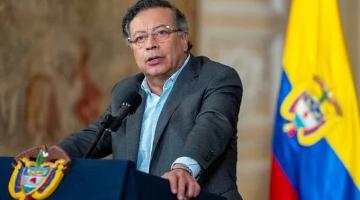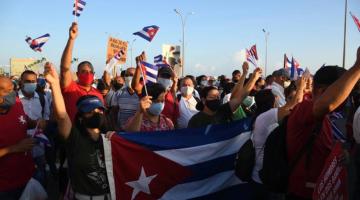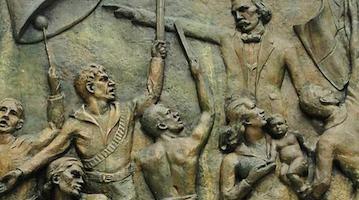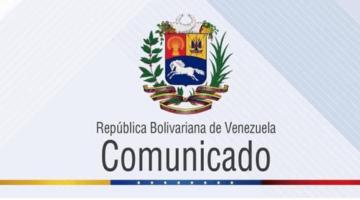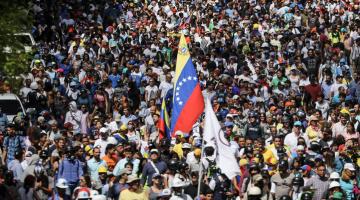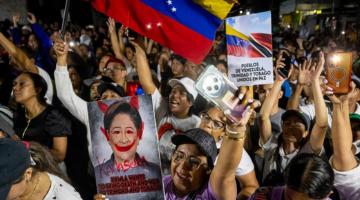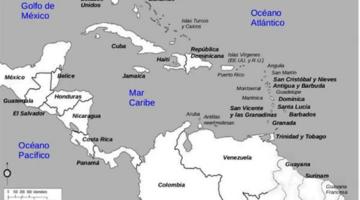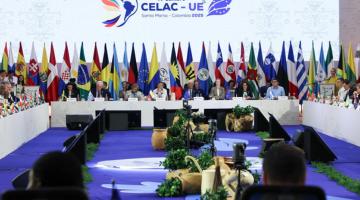Panamanian laborers work on the Panama canal. Courtesy, history.com
Before beginning his term in office, president-elect Donald Trump already proclaimed his intention to seize the Panama Canal. Understanding the importance of the canal and the history of labor, race and national sovereignty in Panama is critical to properly contextualize the gravity of this declaration.
Originally published in AfroResistance.
Donald Trump’s recent threats to reclaim control of the Panama Canal represent an attack on Panamanian sovereignty and reflect imperialist attitudes that have historically marginalized Black communities. These statements, made in the context of a complex political landscape in Panama, require analysis through the lenses of race, class, and territorial sovereignty. From the labor of Caribbean workers who built the Canal to the current struggles for equitable resource distribution, understanding these intersections is essential to addressing U.S. intervention threats and the policies of Panama’s right-wing administration.
Historical Context and the Legacy of Black Labor
The history of the Panama Canal is inseparably linked to the labor of Black migrant men and women. These individuals faced inhumane conditions, low wages, and high mortality rates, yet their contributions were crucial to completing one of the world’s greatest engineering feats. The historical attitude in Panama—and now that of Trump—which ignores this history not only perpetuates invisibilization but also undermines the sacrifices of these communities.
As Williams Comrie and Priestley note, “Trump’s comments not only challenge an internationally recognized and duly ratified treaty, but also reduce the Canal to a commodity that can be claimed at will. This dismissive attitude… erases the memory of those workers, especially the thousands of Black workers whose labor and lost lives underpin the very existence of the Canal.”
Similarly, the U.S. invasion of Panama in 1989 disproportionately affected Black neighborhoods, perpetuating cycles of violence and impoverishment. Today, Black Panamanians remain underrepresented in political discourse and excluded from the wealth generated by the Canal. The December 20th communiqué from Espacio Encuentro de Mujeres emphasizes that the invasion “devastated working-class families, mostly Black and poor, from neighborhoods like El Chorrillo, Marañón, and Santa Ana.”
Neoliberal Contradictions and Territorial Sovereignty
José Raúl Mulino’s administration, though presenting itself as a defender of national sovereignty, has adopted neoliberal policies that betray the interests of Panama’s working class and Black communities. Its alignment with foreign corporations, such as the push to reopen the Cobre Panamá mine, contradicts its supposed commitment to territorial integrity. Williams Comrie and Priestley highlight this contradiction: “Mulino’s nationalist rhetoric about the Darién Gap underscores the potential for political inconsistencies. While his administration preaches sovereignty in its migration and border rhetoric, its current economic policies suggest a willingness to compromise Panama’s territorial autonomy.”
The Canal, a symbol of Panamanian sovereignty, is also a battleground for economic justice. Although it generates significant revenue, these funds primarily benefit the country’s elites. Working-class and Black communities, who bear the historical burden of its construction and recovery, have seen few benefits. Espacio Encuentro de Mujeres highlights this disparity: “Today, that large check goes to a rancid and servile bourgeoisie… embodying submission and servility.”
Recent reports also indicate an increase in U.S. military activity in Panama, with the country being used as a base for strategic operations. The Central Nacional de Trabajadores de Panamá (CNTP) has publicly denounced the presence of U.S. military aircraft stationed at Panama Pacifico, the former Howard Air Force Base near Panama City. This growing military presence raises concerns about Panama’s sovereignty and its implications for historically neglected communities.
Race, Class, and Sovereignty: A Deeper Analysis
The intersection of race and class is not only central but essential to understanding the depth of the current threats to Panama’s sovereignty. Black Panamanians have endured centuries of neglect and structural racism that manifest in specific and devastating ways: the expropriation of historical lands, urban and rural displacement, lack of access to basic services, and ongoing exclusion from the country’s economic development. These inequalities are not only economic but also social and political, perpetuated by a system that privileges the same sectors represented by entrenched white and mestizo elites, while ignoring or invisibilizing the contributions, demands, and needs of Black communities.
Exclusion from Canal Benefits
The Panama Canal exemplifies how race and class have structured the country’s economy. Despite being built by Black Caribbean laborers under extreme exploitation, Black communities have been systematically excluded from the economic benefits generated by this infrastructure. Most of the wealth produced by the Canal has ended up in the hands of an economic and political elite, while Black neighborhoods like El Chorrillo and cities in the Colón province continue to face poverty and a lack of public, economic, and social investment.
As Espacio Encuentro de Mujeres states: “The resources obtained through decades of popular struggle should be invested in the collective welfare of the Panamanian people. Strengthening the pension funds of Social Security would be an act of historical and social justice. However, this is not our reality.” This statement underscores the disconnect between the resources generated by the Canal and the needs of the population, particularly Black and working-class communities, perpetuating a system of structural inequality.
Environmental Impacts and Forced Displacement
The exploitation of natural resources and the development of megaprojects in Panama have disproportionately affected Black and Afro-descendant communities. Projects like the reopening of the Cobre Panamá mine, promoted by Mulino’s government, not only threaten territorial sovereignty but also the environment and local communities dependent on these lands for their livelihoods. These government decisions benefit foreign corporations and local elites, while Black communities are displaced, and their ancestral lands are exploited without consultation or adequate compensation..
The Continuation of Colonialism and Structural Racism
Trump’s threats to reclaim the Canal, coupled with Mulino’s neoliberal policies, represent a continuation of colonialism that has historically marginalized Black communities in Panama. This structural racism not only excludes these communities from access to resources generated by the Canal but also perpetuates narratives that strip them of their agency and historical contributions.
The Urgency of Intersectional Resistance
It is crucial to recognize that the fight for Canal sovereignty is also a fight for racial and economic justice. Black communities in Panama have resisted these forms of exclusion and exploitation for decades, from worker strikes during the Canal’s construction to current protests against neoliberal policies. This resistance not only seeks to protect Panama’s territorial sovereignty but also to claim the right of these communities to be included in the country’s development and to benefit equitably from its resources.
In this context, the intersection of race and class becomes an indispensable framework for analyzing the dynamics of power and exclusion in Panama. Ignoring these dimensions perpetuates the invisibilization of Black communities and deepens existing inequalities. Therefore, the struggle for sovereignty must go hand in hand with a fight for racial and economic equity, ensuring that all communities—especially those historically abandoned—can live with dignity and finally be recognized as fundamental actors in the country’s construction and development.
Calls to Action
AfroResistance calls on social movements, governments, and international allies to:
-
Equitable Redistribution of Canal Resources Demand that the revenues generated by the Canal be redistributed fairly to benefit historically neglected communities, particularly Black and working-class communities. Implement public audits to ensure that Canal funds are invested in critical areas such as education, healthcare, and infrastructure in historically underserved communities, such as neighborhoods like El Chorrillo and cities in Colón province.
-
Historical Recognition Establish educational, social, cultural, and political programs that focus on the historical contributions of Black workers to the construction of the Canal and their role in the recovery of national sovereignty. Create memorials and national recognition days dedicated to Black communities that sacrificed their lives and well-being during the Canal’s construction.
-
Defense of Territorial Sovereignty Oppose all U.S. military presence in Panama and in any other country in the region, as well as any attempts at intervention that compromise the autonomy of these nations. Promote policies that protect the ancestral lands of Black and Afro-descendant communities, halting projects such as extractive mining that displace them and degrade their environment.
-
Strengthening Intersectional Resistance Foster alliances among Black, Indigenous, campesino, and women’s movements to build broad resistance against imperialism and neoliberalism. Convene regional dialogues across Latin America to highlight the intersections of race, class, and sovereignty, building collective strategies to address external and internal threats.
-
Demand Inclusive Public Policies Call on the Panamanian government to design policies that include Black communities in economic development, ensuring equal access to basic services and employment opportunities. Press for the end of the invisibilization of Afro-descendant communities in public policies, guaranteeing their active participation in decision-making processes.
-
International Support Mobilize international solidarity to pressure Panamanian authorities and denounce any foreign intervention or local policies that perpetuate inequality. Collaborate with Afro-descendant movements throughout the diaspora to share experiences, resources, and strategies that strengthen the fight for racial and territorial justice in Panama.
This is a critical moment to act. Only through a joint and committed effort can we ensure that the legacy of Black communities is honored and their rights are protected, guaranteeing a truly sovereign, just, and equitable Panama for all.

